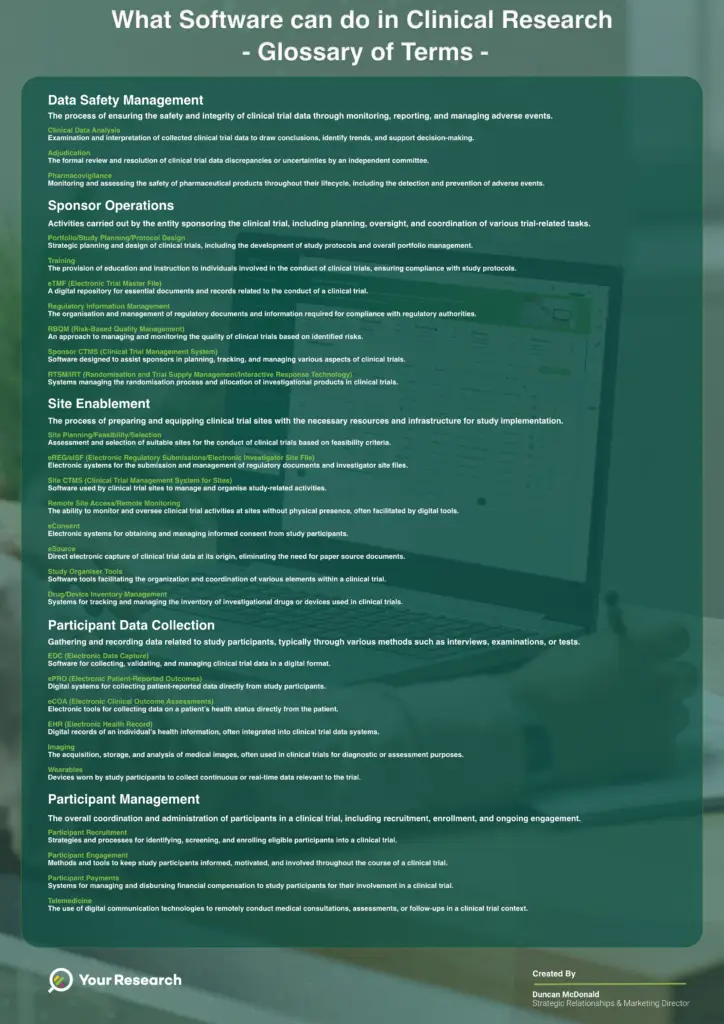Introduction
One way we can assist you navigate software in research is by keeping you informed about the names and functionalities available. So we have complied this brief summary of key terms to offer you a high level overview of what is possible.
Please take a moment to explore the full spectrum of offerings in research software below and if you need further information, don’t hesitate to reach out to one of our team.

Data Safety Management
The process of ensuring the safety and integrity of clinical trial data through monitoring, reporting, and managing adverse events.
Key functions:
Clinical Data Analysis
Examination and interpretation of collected clinical trial data to draw conclusions, identify trends, and support decision-making.
Adjudication
The formal review and resolution of clinical trial data discrepancies or uncertainties by an independent committee.
Pharmacovigilance
Monitoring and assessing the safety of pharmaceutical products throughout their lifecycle, including the detection and prevention of adverse events.
Sponsor Operations
Activities carried out by the entity sponsoring the clinical trial, including planning, oversight, and coordination of various trial-related tasks.
Key functions:
Portfolio/Study Planning/Protocol Design
Strategic planning and design of clinical trials, including the development of study protocols and overall portfolio management.
Training
The provision of education and instruction to individuals involved in the conduct of clinical trials, ensuring compliance with study protocols.
eTMF (Electronic Trial Master File)
A digital repository for essential documents and records related to the conduct of a clinical trial.
Regulatory Information Management
The organisation and management of regulatory documents and information required for compliance with regulatory authorities.
RBQM (Risk-Based Quality Management)
An approach to managing and monitoring the quality of clinical trials based on identified risks.
Sponsor CTMS (Clinical Trial Management System)
Software designed to assist sponsors in planning, tracking, and managing various aspects of clinical trials.
RTSM/IRT (Randomisation and Trial Supply Management/Interactive Response Technology)
Systems managing the randomisation process and allocation of investigational products in clinical trials.
Site Enablement
The process of preparing and equipping clinical trial sites with the necessary resources and infrastructure for study implementation.
Key functions:
Site Planning/Feasibility/Selection
Assessment and selection of suitable sites for the conduct of clinical trials based on feasibility criteria.
eREG/eISF (Electronic Regulatory Submissions/Electronic Investigator Site File)
Electronic systems for the submission and management of regulatory documents and investigator site files.
Site CTMS (Clinical Trial Management System for Sites)
Software used by clinical trial sites to manage and organise study-related activities.
Remote Site Access/Remote Monitoring
The ability to monitor and oversee clinical trial activities at sites without physical presence, often facilitated by digital tools.
eConsent
Electronic systems for obtaining and managing informed consent from study participants.
eSource
Direct electronic capture of clinical trial data at its origin, eliminating the need for paper source documents.
Study Organiser Tools
Software tools facilitating the organisation and coordination of various elements within a clinical trial.
Drug/Device Inventory Management
Systems for tracking and managing the inventory of investigational drugs or devices used in clinical trials.
Participant Data Collection
Gathering and recording data related to study participants, typically through various methods such as interviews, examinations, or tests.
Key functions:
EDC (Electronic Data Capture)
Software for collecting, validating, and managing clinical trial data in a digital format.
ePRO (Electronic Patient-Reported Outcomes)
Digital systems for collecting patient-reported data directly from study participants.
eCOA (Electronic Clinical Outcome Assessments)
Electronic tools for collecting data on a patient’s health status directly from the patient.
EHR (Electronic Health Record)
Digital records of an individual’s health information, often integrated into clinical trial data systems.
Imaging
The acquisition, storage, and analysis of medical images, often used in clinical trials for diagnostic or assessment purposes.
Wearables
Devices worn by study participants to collect continuous or real-time data relevant to the trial.
Participant Management
The overall coordination and administration of participants in a clinical trial, including recruitment, enrolment, and ongoing engagement.
Key functions:
Participant Recruitment
Strategies and processes for identifying, screening, and enrolling eligible participants into a clinical trial.
Participant Engagement
Methods and tools to keep study participants informed, motivated, and involved throughout the course of a clinical trial.
Participant Payments
Systems for managing and disbursing financial compensation to study participants for their involvement in a clinical trial.
Telemedicine
The use of digital communication technologies to remotely conduct medical consultations, assessments, or follow-ups in a clinical trial context.



